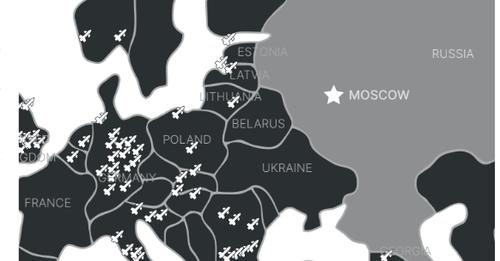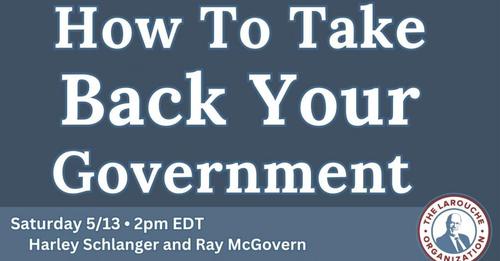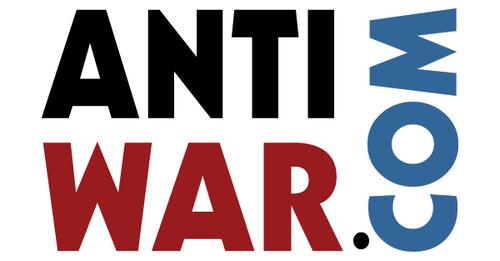
On The Critical Hour, Ray appeals for deeper reflection/more honesty; discussion focuses on article https://raymcgovern.com/2023/05/22/did-putin-have-other-options-on-ukraine/.
May 23, 2023 (13 minutes)


On The Critical Hour, Ray appeals for deeper reflection/more honesty; discussion focuses on article https://raymcgovern.com/2023/05/22/did-putin-have-other-options-on-ukraine/.
May 23, 2023 (13 minutes)

By Ray McGovern, May 22, 2023
The automatic response usually is, “Yes, he certainly had options other than invasion and he should have chosen one of them first”.
This assumption bespeaks the poverty of the discussion on Ukraine. The corporate media is, of course, largely to blame. But others, too, have not taken a hard look at whether the facts support that kind of facile answer. And so, not only has it become holey – yes, holey – dogma; it may get us all killed.
The facile response sits atop a fallacious syllogism that bodes high danger, particularly at this key juncture when misled citizens may acquiesce, yet again, to further escalation in Ukraine. The syllogism:
The Russians had other options to invading Ukraine.
They attacked Ukraine in a ‘war of choice’; also threaten NATO.
Ergo, the West must arm Ukraine to the teeth, risking wider war.
The unexamined major premise lurks in every corner, including in very timely and instructive statements like the one the NY Times published on May 16. (https://eisenhowermedianetwork.org/russia-ukraine-war-peace/). It said:
Our attempt at understanding the Russian perspective on their war does not endorse the invasion and occupation, nor does it imply the Russians had no other option but this war. Yet, just as Russian had other options, so did the U.S. and NATO leading up to this moment.
The attempt at balance – however transparent – is welcome. But are readers not owed some attempt to spell out those “other options”? This is not a marginal quibble; we are talking war. When one glibly asserts, glibly, that that a country that launched hostilities had other options, well, what were they? A statement as lengthy as that published in the NYT might have made room for an attempt to cite one or two of those options (This lacuna was why I demurred when asked to sign the ad.)
Please do not misunderstand. I think that, on balance, the NYT ad was pure gift to those who will be educated by it (and something of a miracle that the Times published it). Besides, I know the crafters and the signers of that statement well enough to rule out any thought that the omission might be attributed to fear of being seen to be in ‘Putin’s pocket’. Likewise, these are not the kind of folks to massage words to ensure political correctness.
Rather, it seems to me likely a case of accepting the ‘received wisdom’ that surely Putin had other options, without thinking that key question through carefully – not fully realizing how important it is to be more fully informative. Especially now.
A Harsher View
Professor Oliver Boyd-Barrett is more harsh – too harsh, in my view – in his criticism of the NYT full-page ad. He gives an approving nod to its call for an adult-type recognition that opponents also have legitimate interests. But he adds that the statement “immediately stumbles at the first gate, namely, by blaming Russia for its Special Military Operation (SMO) in Ukraine”. He attributes this to “an inability to dig behind cliché superficiality”.
Boyd-Barrett: “Putin launched the SMO precisely because he was intelligent enough to confront and defy the reality that the west was relentlessly working towards just such a conflict and that, as Machiavelli once observed, the longer he refrained from acting then the more disadvantageous his ultimate military plight”. https://oliverboydbarrett.substack.com/
Watching What Leaders Say
As a Kremlinologist for half a century I have some insight into what experienced practitioners can glean from media analysis. Historians are usually the best of them. Since media analysts are a vanishing species, I was encouraged to find a thoughtful piece on Ukraine by Geoffrey Roberts, Emeritus Professor of History at University College Cork, Ireland.
Below are short excerpts from an analysis he called, ‘Now or Never’: The Immediate Origins of Putin’s Preventative War on Ukraine (published last December in Journal of Military and Strategic Studies): https://jmss.org/article/view/76584/56335
Humans are the cause of all their own actions, not least in precipitating war. Such actions may be irrational, incoherent or overly emotional, but they remain intelligible and re-presentable in an explanatory narrative of what happened and why. This narrative approach … is empirically driven. It relies on … evidence that enables us to figure out … agent motivations and calculations.
This essay is devoted to the when and why of President Vladimir Putin’s decision to invade Ukraine in February 2022. … It relies almost entirely on the record of Putin’s public pronouncements during the immediate prewar crisis. … What this evidence shows is that Putin went to war to prevent Ukraine from becoming an ever-stronger and threatening NATO bridgehead on Russia’s borders. …
The longer war was delayed, he argued in February 2022, the greater would be the danger and the more costly a future conflict between Russia, Ukraine, and the West. Better to go to war now …
Roberts also pointed out that on Dec. 21, 2022, Putin told Russian military leaders it was “extremely alarming that elements of the US global defense system are being deployed near Russia…If this infrastructure continues to move forward, and if US and NATO military systems are deployed in Ukraine, their flight time to Moscow will be only 7-10 minutes, or even five minutes for hypersonic systems.”
Was Putin Blowing Smoke?
Media analysis joined with those with expertise in more technical areas, can be a huge help to policy makers, congress members – to anyone interested in the facts. I, too, had taken note of what Putin told his military at that critical juncture in late December 2021. I enjoy a huge advantage in being able to consult serious, reliable specialists, among them Ted Postol, professor emeritus (MIT) in physics and former top adviser to the Chief of Naval Operations.
I invite you to view what came out of that collaboration:
No, Putin was not just blowing smoke. Ted and I could demonstrate that U.S. missile emplacements in Romania and Poland were a legitimate concern to Russian leaders; that Putin’s time-to-target information was not exaggerated; and that the analogy we drew with the Cuban missile crisis of 1962 was a helpful way to illustrate that Kremlin concerns were not synthetic, but real.

The ‘Dirty Dozens’ (51 former Intel officials who blamed Hunter’s laptop on Russia) get a NYT page-18 story using up the subjunctive mood. Declarative fact that FBI had the laptop is omitted. Spoiler alert: Tom Fingar may confess; has been honest in past.
https://nytimes.com/2023/05/16/us/politics/republicans-hunter-biden-laptop.html

Prompted by the recent remarks by presidential candidate Robert Kennedy Jr, I was similarly outspoken about the murder of JFK from the vantage point of a freshly minted CIA leader-to-be at the time. Viewers may wish to start at min. 27 of this discussion.
https://laroucheorganization.com/article/2023/05/13/how-take-back-your-government
On ‘Mondays with the Judge’ (Napolitano) he and Ray discuss the latest peregrinations of Zelensky in Europe. His photos are everywhere. Btw who’s that old guy with Zelensky in Rome, with the long white robe? Someone tell him — E.T.-style — to phone home.

… on chance you didn’t know …
Adam Schiff kept this secret for two and a half years; corporate media for three more. What are they covering up?
By Ray McGovern, May 8, 2023
https://www.antiwar.com/blog/2023/05/08/no-one-hacked-those-dnc-emails-in-2016/
“Mondays With the Judge and Ray McGovern”
Ray interviewed by Judge Napolitano, May 4, on drone attempts to assassinate Putin, and on role played by offensive strike missiles on Russia’s periphery (https://raymcgovern.com/2023/05/03/if-the-missile-fits-beware/) in Russia’s decision to invade Ukraine.
Ray McGovern on ‘ABM’ sites in Romania & Poland
Host: Community Church of Boston & Mass. Peace Action
April 25, 2023 (Ray’s talk runs 46 min. starts at min 2:54)
Preparing the talk, I drew heavily on the old-school discipline of media analysis. Then I wove in the experience of weapons experts in an attempt to examine what seems to have been one key motive for Russia’s invasion of Ukraine; namely, offensive missiles being emplaced on Russia’s border.
Background: After the US withdrew from the ABM Treaty, missile emplacements began to appear in Romania and Poland. THE PROBLEM: The Kremlin cannot be sure what missiles are now there, or will be there. To understate the problem, this is destabilizing.
A review of dealings between the U.S. and Russia, with particular focus on Dec. 2021 to Feb. 2022, suggests Russia saw an existential threat from (previously banned) nuclear-capable missiles on its periphery. Sixty years ago President John F. Kennedy faced a similar threat in Cuba. He responded forcefully and Nikita Khrushchev, seeing no existential threat to Russia, backed down. And we got to live another day.
And here we are – still—for the nonce.
+++++++++++++++++++++++++
ADDENDA (2)
1 –
At minute 11:56 I promised to provide the link to Putin’s discussion with Western journalists in June 2016. Here it is:
This video of Putin’s talk includes English subtitles courtesy of translator “Inessa S.” The Western reporters were in Russia to attend the St. Petersburg International Economic Forum. I have taken Inessa’s subtitles and strung them together below into a full transcript for those who prefer to read rather than watch. It appears at the end of this posting.
2 –
One viewer had a question about my quote of Putin, one month after Crimea was annexed, that the missile defense issue was “even more important” than Ukraine joining NATO. The “ABM” site in Romania was already under construction when Putin spoke on April 17, 2014. I answered the question from memory (starting at minute 52:36). The quote came from Putin at one of those marathon “Direct Line” Q and A sessions he holds periodically:
Direct Line, April 17, 2014
Question from Dmitry Kiselyov, head of the state-controlled media group Rossiya Segodnya and TV host:
I’ll create an image with my fingers. Here’s a ring, and it seems to me our country is inside it. I have a feeling that someone is stifling me. I think this is NATO because it is spreading like a cancerous tumor. In the past 25 years, this bloc has literally swallowed our Warsaw Treaty allies, then some parts of the Soviet Union, and the Baltic states. It has opened its jaws to swallow Georgia and now Ukraine as well.
Officials at the NATO headquarters say that it would make sense to admit Ukraine into NATO as well, whereas you’re saying that the bloc system is dying out. I cannot agree with that because I feel this bloc is stifling me.
Of course, you can call me paranoid. … But even if someone has paranoia, it doesn’t mean he isn’t harassed. So it’s not about me, but about NATO’s expansion. Where is the red line? Does it exist at all? And what do you feel as the national leader? Nothing personal, Mr Putin. Thank you.
Putin’s Answer:
… when the infrastructure of a military bloc approaches our borders, we have grounds for certain apprehensions and questions. We must take certain steps … nobody can deny us this right. And this compels us to counteract.
I’ll use this opportunity to say a few words about our talks on missile defense. This issue is no less, and probably even more important, than NATO’s eastward expansion. Incidentally, our decision on Crimea was partially prompted by this. [Emphasis added.]
http://en.kremlin.ru/events/president/news/20796
+++++++++++++++++++++++++
Transcript of Putin’s June 2016 remarks to Western reporters:
The video, https://www.youtube.com/watch?v=kqD8lIdIMRo, includes subtitles in English courtesy of translator “Inessa S.” Putin was speaking to reporters attending the St. Petersburg International Economic Forum, 2016. Inessa’s subtitles are strung together below into text for those who prefer to read rather than watch and as an aid to memory.
Putin to Western Reporters, June 17, 2016
Your people, in turn, do not feel a sense of the impending danger – this is what worries me.
Now, about the missile defense system, listen to me, we are all adults at this table, and experienced [professionals] at that.
But I am not even going to hope that you are going to relay everything, exactly how I said it, in your publications.
Neither will you attempt to influence your media outlets.
I just want to tell you this, on a personal level
I must remind you, though you already know this, that major global conflicts have been avoided in the past few decades, due to the geostrategic balance of power, which used to exist.
The two super-nuclear powers essentially agreed to stop producing both offensive weaponry, as well as defensive weaponry.
It is simple how it works – where one side becomes dominant in their military potential, they are more likely to want to be the first to be able to use such power.
This is the absolute linchpin to international security. The anti-missile defense system [as previously prohibited in international law], and all of the surrounding agreements that used to exist.
It’s not in my nature to scold someone – but when the United States unilaterally withdrew from the ABM Treaty of 1972 they delivered a colossal blow to the entire system of international security.
That was the first blow, when it comes to assessing the strategic balance of power in the world.
At that time [2002] I said that we will not be developing such systems also, because A) it is very expensive, and B) we aren’t yet sure how they will work [for the Americans].
We’re not going to burn our money.
We’re going to take a different option, and develop offensive weaponry, in order to retain said geo-strategic balance.
That was all.
Not to threaten someone else.
They said – “Fine, our defense system is not against you, and we assume that your weaponry is not against us.”
“Do what you like!”
As I already mentioned, this conversation took place in the early 2000s. Russia was in a very difficult state at that time.
Economic collapse, civil war and the fight against terrorism in our Caucasus region, complete destruction of our military-industrial complex …
They wouldn’t have been able to imagine that Russia could ever again be a military power.
My guess is they assumed that even that which was left over from the Soviet Union would eventually deteriorate.
So they said, “sure, do what you like!”
But we told them about the measures we were going to take in reaction. And that is what we did.
And I assure you – that today, we have had every success in that area.
I’m not going to list everything, all that matters is we have modernized our military-industrial complex.
And we continue to develop new generation warfare. I’m not even going to mention systems against the missile-defense system!
No matter what we said to our American partners [to curb the production of weaponry] they refused to cooperate with us, they rejected our offers, and continue to do their own thing.
Some things I cannot tell you right now publicly, I think that would be rude of me.
And whether or not you believe me, we offered real solutions to stop this [arms race].
They rejected everything we had to offer.
So here we are today – and they’ve placed their missile defense system in Romania.
Always saying “we must protect ourselves from the Iranian nuclear threat!”
Where’s the threat?
There is no Iranian nuclear threat.
You even have an agreement with them – and the US was the instigator of this agreement, where we helped.
We supported it.
But if not for the US then this agreement would not exist – which I consider Obama’s achievement.
I agree with the agreement, because it eased tensions in the area. So President Obama can put this in his list of achievements.
So the Iranian threat does not exist.
But the missile systems are continuing to be positioned …
That means we were right when we said that they are lying to us.
Their reasons were not genuine, in reference to the “Iranian nuclear threat.”
Once again, they lied to us.
So they built this system and now they are being loaded with missiles.
You, as journalists, should know that these missiles are put into capsules
Which are utilized from sea-based, midrange Tomahawk rocket launchers
These are being loaded with “anti-missiles’ that can penetrate distances of up to 500km.
But we know that technologies advance …
We even know in which year the Americans will accomplish a new missile, which will be able to penetrate distances of up to 1000km, and then even further …
And from that moment on they will be able to directly threaten
Russia’s nuclear potential
We know year by year what’s going to happen – and they know that we know!
It’s only that you tell tall-tales to, and you spread it to, the citizens of your countries.
Your people, in turn, do not feel a sense of the impending danger – this is what worries me.
How can you not understand that the world is being pulled in an irreversible direction?
That’s the problem.
Meanwhile, they pretend that nothings going on …
I don’t know how to get through to you any more.
And they justify this as a “defense” system, not weaponry that is used for purposes of offense. Systems that “prevent aggression.”
That is absolutely not true.
A missile defense system is one element of a whole system of offensive military potential.
It works as part of a whole that includes offensive missile launchers.
One complex blocks, the other launches a high precision weapon, the third blocks a potential nuclear strike, and the fourth sends out its own nuclear weapon in response.
This is all designed to be part of one system.
This is how it works in current, non-nuclear, but high precision missile defense systems.
Well okay, let’s put aside the actual missile ‘defense’ issue.
But those capsules into which ‘anti-missiles’ are inserted, as I’ve mentioned, they are sea based …
On warships which can carry the Tomahawk subsonic cruise missile system
One could deploy it to position in a matter of hours, and then what kind of “antimissile” system is that?
How do we know what kind of missile is in there? All you have to do is change the programme! (non-nuclear to nuclear)
That’s all it would take.
This would happen very quickly, and even the Romanian government itself won’t know what’s going on.
Do you think they let the Romanians call any shots?
Nobody is going to know what is being done-not the Romanians, and the Polish won’t either.
Do you think I am not familiar with their strategies? Ha!
From what I can see, we are in grave danger.
We had conversation once with our American partners – where they said they’d like to develop ballistic missiles, but without a nuclear warhead.
And we said – “Do you actually understand what that might entail?”
So you’re going to have missiles launching from submarines, or ground territories – this is not a ballistic missile, how do we know whether or not it has a nuclear warhead?!
Can you imagine what kind of scenario you can create?
But as far as I am aware, they did not go through with developing these weapons – they have paused for now.
But the other one they continue to implement.
I don’t know how this is all going to end.
What I do know is that we will need to defend ourselves.
And I even know how they will package this – “Russian aggression “again!
But this is simply our response to your actions.
Is it not obvious that I must guarantee the safety of our people?
And not only that, but we must attempt to retain the necessary strategic balance of power, which is the point that I began with. Let me return to it in order to finish my response.
It was precisely this balance of power that guaranteed the safety of humanity from major global conflict, over the past 70 years.
It was a blessing rooted in a “mutual threat” but this mutual threat is what guaranteed mutual peace, on a global scale.
How they could so easily tear it down, I simply don’t know.
I think it is gravely dangerous. I not only think that, I am assured of it.